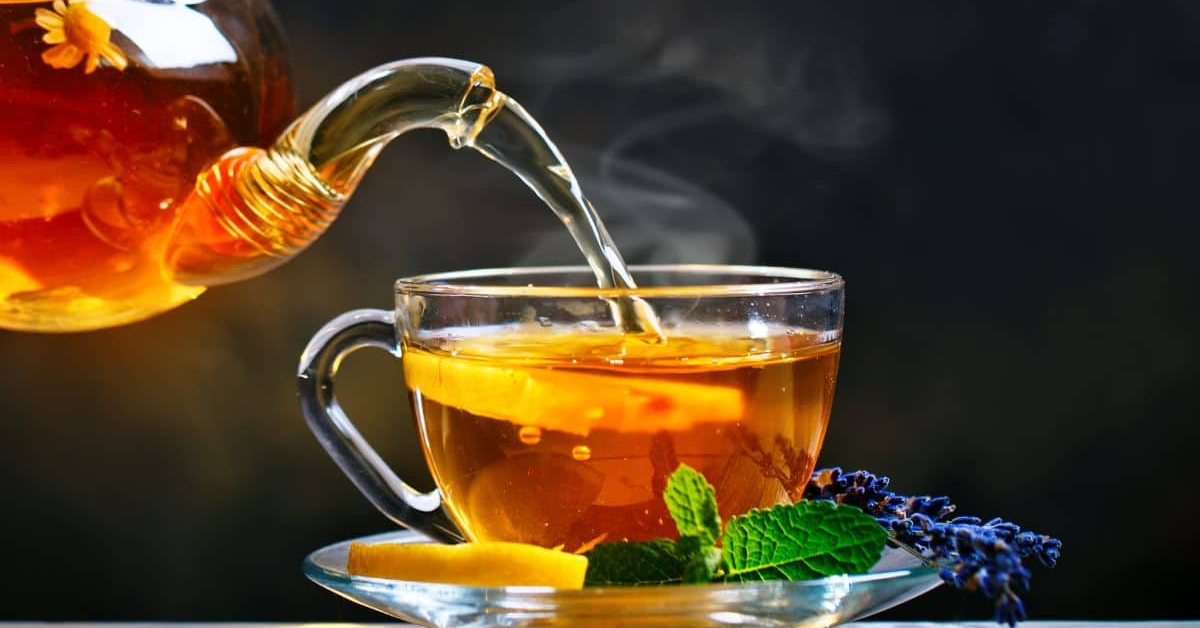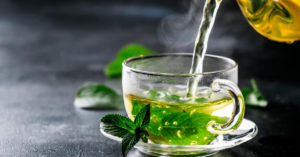Herbal tea is a favorite for those wanting a calm, healthy drink instead of coffee or caffeinated tea. Many wonder if herbal teas have caffeine. This guide will explain the difference between herbal and true teas, look at caffeine in various herbal teas, and share their unique benefits.
Key Takeaways
- Herbal teas are not true teas and are typically caffeine-free, with a few exceptions.
- Common herbal tea ingredients like chamomile, peppermint, and rooibos are naturally caffeine-free.
- Herbal teas can offer a range of health benefits, from promoting relaxation to supporting digestion.
- The optimal time to enjoy herbal tea can vary depending on the specific blend and your individual needs.
- Herbal teas are a great caffeine-free alternative for those looking to reduce their intake or avoid the stimulant effects of traditional teas and coffee.
Understanding Herbal Tea and Its Components
Herbal teas have grown in popularity, offering a refreshing and healthy choice. But what is herbal tea, and how does it differ from true tea? Let’s explore the world of herbal tea components and ingredients.
What Exactly is Herbal Tea?
Herbal tea, also known as tisane, isn’t a traditional tea. Unlike true teas, which come from the Camellia sinensis plant, herbal teas are made from herbs, spices, flowers, fruits, or other plants. They are naturally caffeine-free and offer a wide range of flavors and health benefits.
Common Ingredients in Herbal Teas
Herbal teas have diverse ingredients. Some common ones include:
- Chamomile
- Peppermint
- Ginger
- Lemongrass
- Hibiscus
- Lavender
- Rooibos
- Echinacea
The Difference Between True Teas and Herbal Teas
The main difference between true teas and herbal teas is their origin. True teas, like black, green, or oolong, come from the Camellia sinensis plant and contain caffeine. Herbal teas, made from herbs, flowers, fruits, and other plants, are naturally caffeine-free. This makes them a great choice for those looking for a caffeine-free drink.
Does Herbal Tea Have Caffeine?
Many people wonder if herbal teas have caffeine. But most herbal teas don’t have any caffeine. This is because they’re not made from the Camellia sinensis plant. This plant is where black, green, and oolong teas get their caffeine.
Herbal teas are made from different parts like flowers, leaves, roots, and spices. Each one has its own taste and health benefits. This makes them a great choice for those who want a caffeine-free drink.
- Most herbal teas, such as chamomile, peppermint, and rooibos, are naturally caffeine-free.
- However, there are a few exceptions, such as yerba mate and guayusa, which do contain a moderate amount of caffeine.
- It’s always important to check the specific ingredients in an herbal tea blend to determine its caffeine content.
Knowing that most herbal teas are caffeine-free helps you choose wisely. You can pick from many options for a calming drink at night or a refreshing one in the afternoon. Herbal teas are versatile and can meet your needs.
Popular Herbal Teas and Their Properties
Exploring herbal teas, we find chamomile, peppermint, and rooibos stand out. Each has unique properties and health benefits. They are favorites among tea lovers.
Chamomile Tea Benefits
Chamomile tea is known for its calming effects. It’s made from dried chamomile flowers, packed with antioxidants. For centuries, it’s helped people relax and sleep better.
Enjoying a warm cup of chamomile tea can help you unwind. It’s a great way to get ready for a good night’s sleep.
Peppermint Tea Properties
Peppermint tea is refreshing and invigorating. It’s full of health benefits. The menthol in peppermint leaves helps with digestion and muscle tension.
It can also ease respiratory issues like coughs and congestion. Drinking peppermint tea can boost your well-being.
Rooibos Tea Characteristics
Rooibos, or “red bush” tea, comes from South Africa. It’s caffeine-free and packed with antioxidants, minerals, and polyphenols. Rooibos has a sweet flavor and a vibrant red-orange color.
It’s a great choice for those who want a caffeine-free tea. Rooibos is a flavorful and healthy option.
These three herbal teas offer many benefits. They can help you relax, support digestion, or just enjoy a healthy drink. Adding them to your daily routine can nourish your body and mind.
Best Times to Drink Herbal Tea
Adding herbal tea to your daily routine can boost your health and help you relax. Knowing when to drink it is key. Let’s look at the best times to enjoy herbal tea.
In the morning, herbal tea can be a great choice instead of coffee. Teas like peppermint or ginger can kickstart your digestion. As the day goes on, teas like chamomile or rooibos can calm you down.
For better sleep, herbal teas like valerian or lemon balm are helpful. Drinking these teas in the evening can help you relax and sleep well. It’s a simple way to get ready for a good night’s sleep.
Drinking herbal tea at any time can be a mindful and rewarding act. Matching your tea drinking to your body’s natural rhythms can make it even more beneficial.
| Time of Day | Recommended Herbal Teas | Benefits |
|---|---|---|
| Morning | Peppermint, Ginger | Stimulate digestion, energize the body |
| Afternoon | Chamomile, Rooibos | Promote relaxation, reduce stress |
| Evening | Valerian, Lemon Balm | Enhance sleep quality, induce calmness |
Herbal tea is very versatile. Drinking it at the right times can greatly benefit your health. Try different teas to find what works best for you.
Conclusion
Herbal teas are a great, caffeine-free choice compared to regular teas. True teas like black, green, and oolong have some caffeine. However herbal teas come from plants and offer many health benefits.
Herbal teas like chamomile and peppermint are calming and refreshing. Rooibos has a unique taste. They’re perfect for those who want a caffeine-free drink.
Exploring herbal teas can be fun and rewarding. It’s a way to relax, improve your health, or just enjoy a tasty drink. So, keep trying different herbal teas to find your favorites.
FAQ
Does herbal tea contain caffeine?
Most herbal teas don’t contain caffeine. But, some might, so always check the ingredients.
What are some common ingredients in herbal teas?
You’ll often find chamomile, peppermint, rooibos, ginger, hibiscus, and lemon balm in herbal teas.
What is the difference between true teas and herbal teas?
True teas come from the Camellia sinensis plant and have caffeine. Herbal teas, made from other plants, are usually caffeine-free.
What are some examples of popular herbal teas and their properties?
Popular herbal teas include: – Chamomile tea: it’s calming and soothing. – Peppermint tea: it aids digestion and tastes refreshing. – Rooibos tea: it’s caffeine-free and packed with antioxidants.
When is the best time to drink herbal tea?
You can drink herbal tea anytime, based on its properties. Chamomile is great for unwinding at night. Peppermint is perfect for a midday boost.
Does Twinings herbal tea have caffeine?
Most Twinings herbal teas are caffeine-free but always check the specific blend.
Can herbal tea help you sleep?
Yes, many caffeine-free herbal teas like chamomile are excellent for promoting relaxation and sleep.
Are there herbal teas for weight loss?
Some herbal teas like green tea and ginger tea may support metabolism, though results vary.




